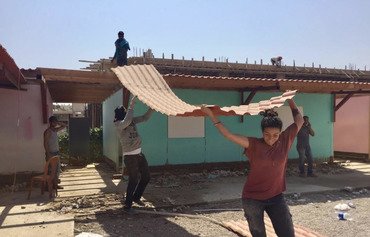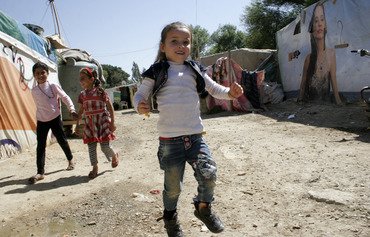Lebanon and international organisations operating in its territory are facing the challenge of educating approximately 400,000 Syrian refugee school-age children.
Last year, 113,000 enrolled in schools, and the United Nations International Children's Fund (UNICEF) hopes to enroll another 130,000 students in the 2017-2018 school year.
International organisations, local non-governmental organisations (NGOs) and the Ministry of Education are co-operating to educate as many refugee students as possible at centres and schools opened inside and near refugee camps.
The initiatives aim to provide remedial and accelerated "informal" education programmes to students, enabling them to enroll in formal schools and receive an official diploma upon completion of the programme.
One such NGO dedicated to educating refugee children is the Kayany Foundation.
Since its establishment in 2013, Kayany has established six schools near refugee camps in the Bekaa town of Bar Elias. In November 2016, it opened the Shams library in Majdal Anjar.
Restoring the right to education
Kayany inaugurated a seventh school on February 8th in the town of Meksi, also in the Bekaa Valley.
Kayany founder Nora Walid Jumblatt put the inauguration of the seventh school in the context of "every child's right to education according to international law".
"These schools restored that right and hope of a bright future," she told Al-Mashareq. "Without the education of children, an entire generation's dream of a better future would be shattered."
The newly-opened school seats 600 students aged between 6 and 14, she said, adding the seven schools collectively provide free education and one meal per day to more than 3,500 pupils.
If the schools could seat more children they would, she said, "given the urgent need in this regard".
Jumblatt said Kayany's schools "provide remedial and support classes to enable [Syrian] students to study the official Lebanese curriculum in two shifts, in the morning and evening".
"They also provide psychological support to students because we are aware of the extent of the human and psychological suffering they have been going through since the outbreak of the Syrian war," she said.
Syrian and Lebanese teachers are undergoing training under the supervision of the American University of Beirut (AUB), she said.
Expanding knowledge
The schools were established inside and near refugee camps "to provide a safe space and hope to these children", she explained, "while the Shams library potentially contributes to expanding their knowledge, broadening their horizons and enhancing their openness to the world".
Despite the efforts of the Ministry of Education and Higher Education to accommodate Syrian students in public schools, there are still more than 250,000 children without education.
This puts an entire generation at risk and denies them their basic rights, Jumblatt said.
"We give them the opportunity to continue their education so that they may play a positive role in society, and someday help rebuild their country," she said.
Kayany is not working alone in this regard, she said. "A group of official institutions are participating with us in these educational projects, [...] most notably the Ministry of Social Affairs, the AUB, the Boghossian Foundation, the Malala Yousafzai Foundation and a number of benefactor friends."
Passport to a better future
UNICEF media official Salam al-Janabi said the Kayany Foundation initiative represents an opportunity to prepare Syrian students for enrollment in public schools and to earn an official diploma.
UNICEF, with the co-operation of the Lebanese Ministry of Education, provides a large number of refugee children with a formal education in public schools and accelerated education programmes in afternoon shifts to bring up to speed those who have not been in schools in a long time, he said.
"NGOs complement our efforts with their initiatives to provide [students] with informal education to ensure they can eventually enroll in public schools," he told Al-Mashareq.
"The number of school age Syrian children (5 to 13 years old) is about 400,000, while the number of students qualified to access official primary education is about 250,000," he said.
Of those, 113,000 registered last year and sat alongside 144,000 Lebanese student in public schools, al-Janabi said.
UNICEF hopes that "130,000 will be enrolled in 2017, especially that the funding [from international donors and organisations] for their education is available", he said.
Earning an official diploma "is their passport to completing their education in Lebanon or in their country upon their return", al-Janabi said.
"A number of students from Kayany schools enrolled in formal education schools at a later stage after successfully passing the [final] exams of the accelerated learning they received," he noted.
Kayany and other NGOs working to educate children are not official partners with UNICEF, al-Janabi said, "but their work protects children, which makes them our partners in ensuring the children are protected with the education, albeit informal, they provide to them".
Putting students on track to succeed
Any initiative in the Bekaa Valley aimed at educating Syrian students "serves their future and puts them on the right track", said Rihana Itani, education co-ordinator for Sawa for Development and Aid, a Bekaa-based NGO that runs three schools serving 500 Syrian students.
In providing special education centres where Syrian students can receive informal or accelerated education programmes, NGOs help to qualify students for admission to formal schools and develop their learning abilities and discipline, as well as provide them with the psychological support they need, she said.
Syrian students "are in need of various types of educational programmes, especially those who were out of school for many years and never enrolled in any of the available informal or accelerated education programmes", she told Al-Mashareq.
"All education-related initiatives are good, but what is even more important is for students to later enroll in public schools to receive their official diplomas," Itani said.

![Syrian refugee students attend class at a new school inaugurated February 8th by the Kayany Foundation in the town of Maksi in the Bekaa Valley. [Photo courtesy of Kayany Foundation]](/cnmi_am/images/2017/02/27/7310-lebanon-kayany-school-600_384.jpg)







Salam Do you need English, Biology or chemistry teachers؟
Reply10 Comment(s)
In short, shut down this school because our children have learned nothing in three years. Save the fees for others. Let others who are competent handle it.
Reply10 Comment(s)
Please send the number of of the principal of Kayani school in Barelias.
Reply10 Comment(s)
Please arrange for pickups for children to school. The previous ones weren’t abiding by … please pay attention to this and thanks for your efforts.
Reply10 Comment(s)
How? I'd like to enroll.
Reply10 Comment(s)
Thank you for your efforts. There is one remark I want to make. The bus doesn't commit to take children from their homes. The kids stand for a while on the street waiting and sometimes he doesn't show up. Please pay attention to this issue at Kyani school in Mekseeh town in Bekaa. Thanks a lot!
Reply10 Comment(s)
Hello. Can my wife, who is a teacher, have a vacancy with you for the primary stage?
Reply10 Comment(s)
I have two children. Can they join this school? They are aged 8 and 13. I live at the 001 Camp. [Gibberish]
Reply10 Comment(s)
Is there a school in al-Harmal or al-Qasr?
Reply10 Comment(s)
We thank the efforts of all those who help rescue Syria's children from ignorance.
Reply10 Comment(s)